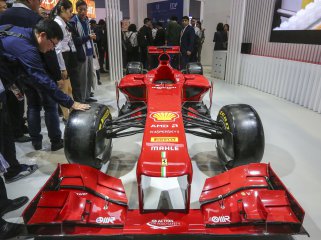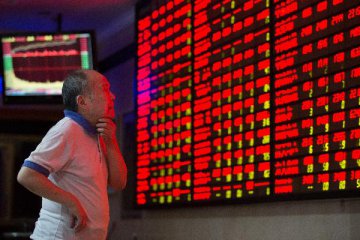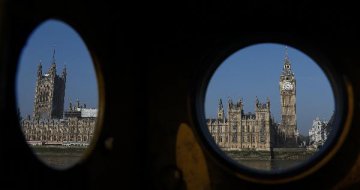While Europe struggles with Brexit, a visitor to its southern shore this week is exposing divisions that could have even bigger consequences for its place in the world: over how to deal with China.
Chinese President Xi Jinping’s trip to Italy and France, beginning Thursday, will take him to countries on opposite sides of the European Union’s divide. France, with newfound support from Germany, wants the EU to protect itself more robustly against China’s growing economic and political clout. Italy, which is less enamored with the EU and has a weaker economy, wants to make money through closer China ties.
The divisions run between and within countries: Some Europeans see China mainly as a business opportunity, others as a would-be hegemon that wants to reshape the international order. In addition, Europe’s free traders are suspicious of Franco-German proposals for economic protections against China, which they fear could reduce the EU’s broader commitment to open, competitive markets—a stance that is already losing a key advocate as the U.K. stumbles toward an EU exit.
Europe’s quest for a coherent approach comes as the region finds itself squeezed by the growing rivalry between China and the U.S. While Beijing is cultivating relationships with individual countries, particularly in Europe’s poorer east and financially fragile south, Washington is putting pressure on Germany and others to turn down Chinese infrastructure investments that U.S. diplomats argue could hurt Western security interests.
Meanwhile, EU governments fear both the global economic fallout from U.S.-Chinese trade disputes and the possibility that the Trump administration could strike a trade deal with China that leaves Europe’s industries at a disadvantage.
The trade tensions among Europe, America and China are a taste of one of the biggest challenges facing the EU in coming decades: how to promote the international order that Europe wants, based on rules and reciprocity, in a world containing two superpowers that aren’t shy about flexing their muscles.
“The EU is in danger of becoming a playground for the U.S. and China as they pursue their geoeconomic competition,” said Thorsten Benner, director of the Global Public Policy Institute, a nonpartisan think tank in Berlin. “Europe needs more unity to have a fighting chance to be an actor in its own right.”
Chinese Foreign Minister Wang Yi, speaking to media in Brussels on Monday, brushed off criticism that China’s economic diplomacy has sought to divide the EU. “Between China and Europe, sometimes we have differences, but we have far more common ground,” he said.
European attitudes to China are hardening, however. After Donald Trump’s election as U.S. president, some in Europe thought they could enlist China’s support for multilateral arrangements on trade, climate change and security that the new U.S. leader has criticized or pulled out of. Instead, EU policy makers have grown disillusioned with China’s own unilateral assertiveness, from moves to tighten its grip on the South China Sea, to a lack of reciprocity on access for businesses.
The shift is most obvious in Germany, where Chinese corporate takeovers of companies with technological know-how have led to tighter controls screening foreign investment.
German Foreign Minister Heiko Maas said Monday that EU countries shouldn’t be naive about Beijing’s use of economic policy to promote its strategic influence. “Ultimately we all benefit if we stay united against China,” he said.
German business and politics remains divided on how open the country should be to Chinese investment, however. Chancellor Angela Merkel’s government is under U.S. pressure to exclude China’s Huawei Technologies Co. from supplying Germany with 5G mobile-internet equipment. The issue is pitting German business interests against its national-security establishment.
In a sign of the shifting balance in Europe, the EU’s Brussels-based executive, the European Commission, last week produced a markedly China-skeptical strategy paper for EU leaders to discuss at their summit Thursday. The commission said China is on some issues “a systemic rival promoting alternative models of governance,” and warned that EU countries can’t achieve their China aims without unity.
“The zeitgeist has changed. China is nobody’s gentle giant anymore,” said François Heisbourg, special adviser to the Foundation for Strategic Research, a Paris think tank. “The Germans have realized that China is not simply like Japan 40 years ago: It’s a strategic player, not only an economic partner.”
Italy’s EU-skeptic populist government, however, is pursuing a commerce-first approach. In Rome on Saturday, Prime Minister Giuseppe Conte is due to sign an agreement to cooperate on the Belt and Road Initiative—China’s global plan for a network of ports, roads, railways and pipelines to expand its trade links and strategic influence. The Chinese-Italian memorandum of understanding has sparked criticism from the U.S. and alarm in the EU, which fears Beijing is trying to draw important EU members into its web of economic and diplomatic influence.
Although 13 smaller EU countries have signed Belt and Road memorandums with Beijing, Italy would be the biggest European country to do so, and the first member of the Group of Seven major advanced economies. Its expected signature is a major diplomatic win for Mr. Xi, whose global infrastructure plan has faced criticism for opaque financial deals that have left some participant countries with burdensome debt to China.
Italy’s government, which includes self-styled “sovereigntist” politicians who want greater national freedom of action within the EU, says the memorandum with China is nonbinding and doesn’t conflict with EU policies. Italian officials have pointed out that their country has smaller trade and investment ties with China than Germany, France or the U.K., with some in Rome accusing their fellow EU members of hypocrisy.
“Our economic-commercial focus on this infrastructure and on China is fully legitimate. And it is justified precisely in the light of our national interests. In this way, we can enhance our exports to a market of enormous size,” Mr. Conte told Italy’s Parliament on Tuesday.
“Italy is following a mix of political sovereigntism and economic weakness,” said Nathalie Tocci, director of the Institute of International Affairs, a Rome think tank, who is a foreign-policy adviser to the EU. “We’ve entered a recession, and there is a false hope that Chinese money will somehow be easier to get than U.S. or other Western investment.”
After visiting Rome, Palermo and Monte Carlo, Mr. Xi is due to meet French President Emmanuel Macron for dinner Sunday on the French Riviera, followed by talks at the Élysée presidential palace in Paris the next day. Mr. Macron has previously pressed China for more reciprocity in trade and investment. “France will be more cautious towards Xi than Italy,” Mr. Heisbourg said.
Source: The Wall Street Journal






















Latest comments